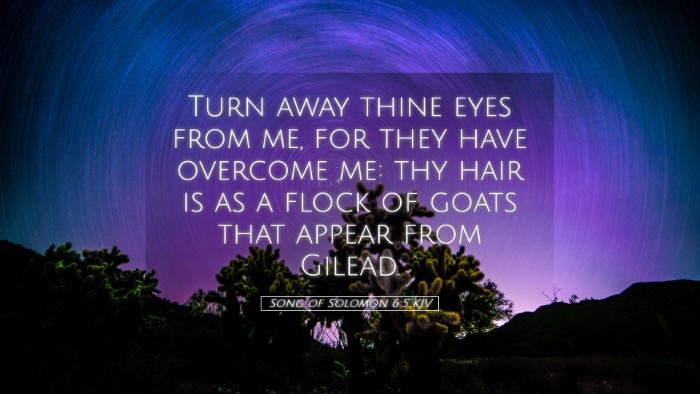Old Testament
Genesis Exodus Leviticus Numbers Deuteronomy Joshua Judges Ruth 1 Samuel 2 Samuel 1 Kings 2 Kings 1 Chronicles 2 Chronicles Ezra Nehemiah Esther Job Psalms Proverbs Ecclesiastes Song of Solomon Isaiah Jeremiah Lamentations Ezekiel Daniel Hosea Joel Amos Obadiah Jonah Micah Nahum Habakkuk Zephaniah Haggai Zechariah MalachiSong of Solomon 6:5
Song of Solomon 6:5 KJV
Turn away thine eyes from me, for they have overcome me: thy hair is as a flock of goats that appear from Gilead.
Song of Solomon 6:5 Bible Commentary
Commentary on Song of Solomon 6:5
Verse: "Turn away your eyes from me, for they have overcome me: your hair is as a flock of goats that appear from Gilead."
Introduction
The Song of Solomon, attributed to Solomon, presents a unique collection of poetic expressions celebrating love, beauty, and desire. In 6:5, we see a profound moment of dialogue that encapsulates the deep emotional connection between lovers. This commentary synthesizes insights from esteemed public domain commentators to elucidate the layers of meaning inherent in this verse.
Thematic Overview
The themes of beauty, vulnerability, and desire are prevalent throughout the Song of Solomon. In this verse, the bride expresses the overwhelming effect her lover's gaze has on her. The symbolism of hair as a flock of goats conveys both beauty and the natural allure of the beloved.
1. The Overpowering Gaze
Matthew Henry reflects on the line "Turn away your eyes from me, for they have overcome me." He highlights the impact of the lover's gaze as a metaphor for the profound effect that love can have on an individual, causing a state of emotional and spiritual vulnerability. This gaze signifies not only desire but also a recognition of the profound power that attraction holds.
2. Symbolism of Hair
Albert Barnes elaborates on the imagery of hair being compared to a “flock of goats.” This simile suggests lushness and abundance, representing the beauty of the beloved. Goats from Gilead were known for their fine and beautiful fleece, indicating not only physical allure but also an association with fertility and richness. Hair in this context transcends physical beauty, embodying the essence of the beloved's spirit and vitality.
3. Emphasis on Beauty
Adam Clarke comments on the expressive beauty of the bride as she is enchanted by her lover. The hair represents not just external beauty, but also the inner qualities of grace and charm that affect the beholder deeply. Furthermore, this passage invites the reader to reflect on the nature of beauty in a spiritual sense, hinting at a higher aesthetic that connects lovers in a divine relationship.
Spiritual Interpretations
Beyond the sensual and romantic connotations, this verse can be interpreted spiritually. The relationship depicted can symbolize the profound bond between Christ and the Church.
1. Christ’s Alluring Presence
Matthew Henry draws parallel lines to the relationship believers have with Christ. The overwhelming nature of Christ's love can leave individuals in a state of awe and reverence. Just as the bride is captivated by her lover, so too are believers drawn to the beauty and holiness of Christ.
2. The Need for Divine Encounter
Albert Barnes notes that the need to turn away is significant; there is a recognition that within each person exists a profound human need for divine touch and encounter. The gaze of the beloved can be seen as a reflection of God's attention towards humanity. This divine gaze brings both comfort and a sense of responsibility, compelling believers to respond through obedience and worship.
3. The Nature of Love and Commitment
Adam Clarke articulates that true love encompasses both admiration and humility. The act of asking for distance is not one of rejection, but a desire to preserve the sanctity of love, accentuating that it demands recognition of one’s own vulnerabilities. In a theological context, this reflects the love that God seeks from His people—a love that acknowledges His grandeur while recognizing human limitation.
Pastoral Applications
For pastors and church leaders, this verse offers rich material for sermons and teachings on love, beauty, and relationships.
- Encouragement in Relationships: Learn how to foster appreciation and devotion within relationships, highlighting the importance of seeing and valuing each other's unique qualities.
- Understanding Vulnerability: Encourage congregants to embrace their vulnerabilities in the context of love, both human and divine, as a pathway to deeper relationships.
- God's Gaze: Explore the theme of how being loved by God can be overwhelming, leading individuals to deeper worship and commitment.
Conclusion
Song of Solomon 6:5 encapsulates a moment of beauty, vulnerability, and deep emotional connection between lovers. Through the insights of notable commentators, readers are invited to explore the complexities of attraction and the divine implications within romantic love. The powerful themes illustrated in this verse encourage both personal reflection and enriching dialogue on love in all its forms.


